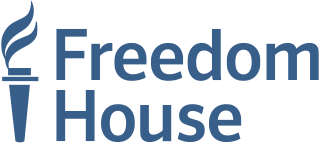
Freedom House is a non-profit organization based in Washington, D.C. It is best known for political advocacy surrounding issues of democracy, political freedom, and human rights. Freedom House was founded in October 1941, with Wendell Willkie and Eleanor Roosevelt serving as its first honorary chairpersons. Most of the organization's funding comes from the U.S. State Department and other government grants. It also receives funds from various semi-public and private foundations, as well as individual contributions.
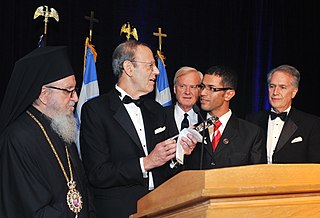
The National Endowment for Democracy (NED) is a quasi-autonomous non-governmental organization in the United States founded in 1983 to advance democracy worldwide, by promoting political and economic institutions, such as political groups, trade unions, free markets, and business groups.
Human rights in Cuba are under the scrutiny of human rights organizations, which accuse the Cuban government of committing systematic human rights abuses against the Cuban people, including arbitrary imprisonment and unfair trials. International human rights organizations such as Amnesty International and Human Rights Watch have drawn attention to the actions of the human rights movement and designated members of it as prisoners of conscience, such as Óscar Elías Biscet. In addition, the International Committee for Democracy in Cuba led by former statesmen Václav Havel of the Czech Republic, José María Aznar of Spain and Patricio Aylwin of Chile was created to support the Cuban dissident movement.

The Democratic Solidarity Party was a political liberal party in Cuba. Although changes to the Cuban constitution in 1992 decriminalized the right to form political parties other than the Communist Party of Cuba, these parties are not permitted to campaign or engage in any public political activities on the island. The Democratic Solidarity party described itself as "an organization from within Cuba promoting democracy and the respect for human rights by the peaceful route." The last President of the party was Fernando Sánchez López. The party was a full member of Liberal International.

The International Republican Institute (IRI) is an American nonprofit organization founded in 1983 and funded and supported by the United States federal government. Most of its board is drawn from the Republican Party. Its public mission is to advance freedom and democracy worldwide by helping political parties to become more issue-based and responsive, assisting citizens to participate in government planning, and working to increase the role of marginalized groups in the political process, including women and youth. It has been repeatedly accused of foreign interference and has been implicated in the 2004 Haitian coup d'état. It was initially known as the National Republican Institute for International Affairs.

Oswaldo Payá Sardiñas was a Cuban political activist. A Roman Catholic, he founded the Christian Liberation Movement in 1987 to oppose the one-party rule of the Cuban Communist Party. He attracted international attention for organizing a petition drive known as the Varela Project, in which 25,000 signatories petitioned the Cuban government to guarantee freedom of speech and freedom of assembly as well as to institute a multi-party democracy. In recognition of his work, he received the European Parliament's Sakharov Prize and People in Need's Homo Homini Award.

The Cuban dissident movement is a political movement in Cuba whose aim is to replace the current government with a liberal democracy. According to Human Rights Watch, the Marxist-Leninist Cuban government represses nearly all forms of political dissent.

Mehdi Bazargan was an Iranian scholar, academic, long-time pro-democracy activist and Prime Minister of Iran's interim government.

Elections in Cuba are held at municipal, provincial, and national levels. Cuba is a one-party state, with the Communist Party of Cuba being described as the "superior driving force of the society and the state" in the Constitution of Cuba, and the communist party is the only official political party. Elections in Cuba are not considered democratic because the government does not allow free and fair voting.

Antonio López-Istúriz White is a Spanish politician and Member of the European Parliament (MEP) from Spain. He is a member of the People's Party, member party of the European People's Party. He has served as the Secretary General of the European People's Party since March 2002 till May 2022.
The Damascus Spring was a period of intense political and social debate in Syria which started after the death of President Hafiz al-Assad in June 2000 and continued to some degree until autumn 2001, when most of the activities associated with it were suppressed by the government. It started with the Statement of 99 and the establishing of the Committees of Civil Society, then the Statement of 1000 was issued carrying the signature of 1000 Syrian intellectuals in 2001.
The Lawton Foundation was founded in 1997 in Havana, Cuba, as a non-governmental organization to promote the "study, defense and denunciation of human rights inside Cuba". The group was formed by Christian anti-abortion activist Oscar Elías Biscet González and is made up of adult Cuban citizens of all ages, social groups, professionals as well as non-professionals. The group claims to have been censured, harassed, mistreated and incarcerated by the Cuban authorities. The Lawton Foundation has a branch in the United States and other branches internationally.
Censorship in Cuba is the topic of accusations put forward by several foreign groups-organizations and political leaders, as well as Cuban dissidents. The accusations led the European Union to impose sanctions from 2003 to 2008 as well as statements of protest from groups, governments, and noted individuals.
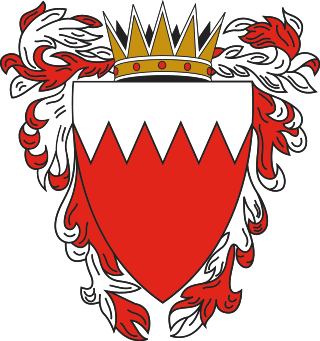
Bahrain's record on human rights has been described by Human Rights Watch as "dismal", and having "deteriorated sharply in the latter half of 2010". Their subsequent report in 2020 noted that the human rights situation in the country had not improved.
The Cuban Democratic Directorate is a nongovernmental organization that supports the human rights movement in Cuba. The organisation is heavily financed by the United States government through the National Endowment for Democracy program, receiving $650,000 in 2022.
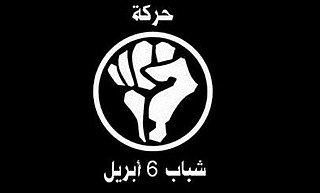
The April 6 Youth Movement is an Egyptian activist group established in Spring 2008 to support the workers in El-Mahalla El-Kubra, an industrial town, who were planning to strike on 6 April.

Burhan Ghalioun is a French-Syrian professor of sociology at the Université de Paris III Sorbonne University in Paris, and the first chairman of the Syrian opposition Transitional National Council (SNC). He was named chairman on 29 August 2011. His chairmanship was criticized for his perceived closeness to the Muslim Brotherhood, his early reluctance to arm opposition forces, and what opponents called the autocratic nature of his leadership. On 17 May 2012, feeling he had become an increasingly divisive figure for the council, Ghalioun resigned.
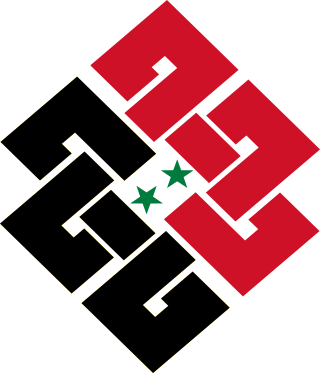
The National Coordination Committee for Democratic Change (NCC), or National Coordination Body for Democratic Change (NCB), is a Syrian bloc chaired by Hassan Abdel Azim consisting of 13 left-wing political parties and "independent political and youth activists". It has been defined by Reuters as the internal opposition's main umbrella group. The NCC initially had several Kurdish political parties as members, but all except for the Democratic Union Party left in October 2011 to join the Kurdish National Council. Some opposition activists have accused the NCC of being a "front organization" for Bashar al-Assad's government and some of its members of being ex-government insiders.

The Syrian opposition is the political structure represented by the Syrian National Coalition and associated Syrian anti-Assad groups with certain territorial control as an alternative Syrian government.
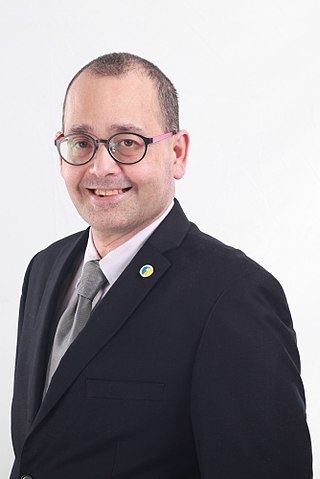
Jose Luis Martin Cosgayon Gascon, also known as Chito Gascon, was a Filipino lawyer, civic organizer, and human rights activist. In 2015, he was appointed by then President Benigno S. Aquino III as the Chair of the Commission on Human Rights of the Philippines serving a term from 2015 to 2021.













